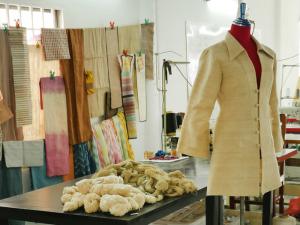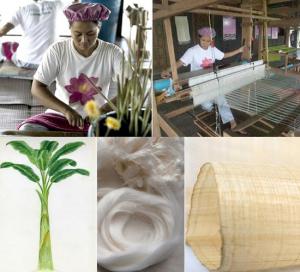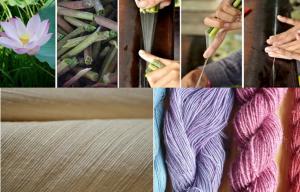Flower Power is Back and Ready to Wear
SIEM REAP, CAMBODIA, May 5, 2015 /EINPresswire.com/ -- The 21st century, with its renewed emphasis on the environment and sustainable living, has dramatically upgraded the interpretation of what eco-friendly means. Once upon a time, having ecological awareness meant that you recycled your water bottles and turned out the lights when you left a room. But contemporary awareness means that, as prefixes go, “eco” can front a variety of words to cover every aspect of life, not just what we eat and what we throw away, but also what we wear. If you think Flower Power refers to a tie-dyed vintage hippie wardrobe left over from the 1960s, think again.
When Awen Delaval and Joel Woodcock talk about Flower Power, they’re not talking about a revival of the first Woodstock generation. They genuinely mean Flower Power as a dynamic product created by Samatoa, the eco-textile company founded by Delaval in 2003. Since its founding, the company now offers a complete line of high-quality fabrics, clothing, handbags, and scarves. But in 2009, Delaval was introduced to a new style of textile manufacturing when he learned that the robes worn by Burmese monks are made from lotus fibers. As an eco-friendly fashion designer, Delaval was intrigued. He set up a laboratory at his Siem Reap home to pursue this craft, searching and experimenting for the perfect lotus to create lotus fabric, the most ecological fabric in the world.
The development of the company came about as an effort to empower Cambodian women living in marginalized villages that could not provide economic opportunity, and the company has achieved success in that goal. But now the goal—a Kickstarter crowdfunding campaign goal, to be exact—is calling on crowdfunding support to raise $10,000 by May 26 in order to show the world what Flower Power can do.
More than 50 good jobs have been provided for Cambodian lotus farmers, spinners and weavers who are paid a living wage, paid leave, health insurance and a safe working environment, along with trade union rights. But business on a small scale means that Samatoa can only fulfill 10 percent of the requests submitted by clients. Increasing the lotus farms by ten will train 500 artisans to manufacture lotus fabric, becoming industry leaders in an innovative, high-potential sector while making it possible for Samatoa to meet its clients’ needs. The impact on the local Cambodian economy will contribute to the financial and social development of worker families and their communities.
The year 2009 saw the company establishing its first Lotus Farm, where 15 hectares of sacred lotus flowers were harvested on the lake of Kamping Poy in Battambang. Four years later, Samatoa’s second lotus farm was set up in Siem Reap, Phnom Krom.
In 2011, Delaval teamed up with Portland Oregon’s Joel Woodcock, who has lived or worked in Southeast Asia for more than two decades. Woodcock’s company, like Delaval’s, is dedicated to empowering local artisans by creating sustainable employment and training opportunities that lead to the manufacturing of high-quality handcrafted products. Together, the two had a common goal: to raise awareness of their innovative lotus fabric and fiber. They have found that by providing luxury designs and access to markets, their products can bridge the gap between the world of fashion and artisan producers, creating truly sustainable opportunities for their communities.
Samatoa is an award-winning pioneer in the field of ethical culture. Their lotus flower fabric has received UNESCO’s seal of excellence as well as praise from international luxury designers. Samatoa wants to offer a complete line of lotus fabric products that will include clothing, scarves, and handbags. The couture line of apparel made from the lotus fabric is very light, soft, and extremely breathable. As befits its name, Flower Power products are both beautiful and durable.
Lotus fiber fabric has been known in Cambodia for centuries. But now that the secret is out, Flower Power is in!
About Samatoa
Awen Delaval founded Samatoa (www.samatoa.com), an eco-textile company in 2003 as part of an effort to empower economically vulnerable women in marginalized Cambodian villages. Samatoa employs fair-trade, ethical commerce in order to bridge the gap between the affluent and the disadvantaged, and by this commitment, the company contributes to training, emancipation, and access to international recognition for their artisans. They do this by using the lotus flower, which is sacred for Buddhists, who regard it as a symbol of the ability of every man and woman to surpass their current existence. Ten years of research led to the creation of the most ecological fabric in the world, the lotus fabric, made from the lotus flower.

When Awen Delaval and Joel Woodcock talk about Flower Power, they’re not talking about a revival of the first Woodstock generation. They genuinely mean Flower Power as a dynamic product created by Samatoa, the eco-textile company founded by Delaval in 2003. Since its founding, the company now offers a complete line of high-quality fabrics, clothing, handbags, and scarves. But in 2009, Delaval was introduced to a new style of textile manufacturing when he learned that the robes worn by Burmese monks are made from lotus fibers. As an eco-friendly fashion designer, Delaval was intrigued. He set up a laboratory at his Siem Reap home to pursue this craft, searching and experimenting for the perfect lotus to create lotus fabric, the most ecological fabric in the world.
The development of the company came about as an effort to empower Cambodian women living in marginalized villages that could not provide economic opportunity, and the company has achieved success in that goal. But now the goal—a Kickstarter crowdfunding campaign goal, to be exact—is calling on crowdfunding support to raise $10,000 by May 26 in order to show the world what Flower Power can do.
More than 50 good jobs have been provided for Cambodian lotus farmers, spinners and weavers who are paid a living wage, paid leave, health insurance and a safe working environment, along with trade union rights. But business on a small scale means that Samatoa can only fulfill 10 percent of the requests submitted by clients. Increasing the lotus farms by ten will train 500 artisans to manufacture lotus fabric, becoming industry leaders in an innovative, high-potential sector while making it possible for Samatoa to meet its clients’ needs. The impact on the local Cambodian economy will contribute to the financial and social development of worker families and their communities.
The year 2009 saw the company establishing its first Lotus Farm, where 15 hectares of sacred lotus flowers were harvested on the lake of Kamping Poy in Battambang. Four years later, Samatoa’s second lotus farm was set up in Siem Reap, Phnom Krom.
In 2011, Delaval teamed up with Portland Oregon’s Joel Woodcock, who has lived or worked in Southeast Asia for more than two decades. Woodcock’s company, like Delaval’s, is dedicated to empowering local artisans by creating sustainable employment and training opportunities that lead to the manufacturing of high-quality handcrafted products. Together, the two had a common goal: to raise awareness of their innovative lotus fabric and fiber. They have found that by providing luxury designs and access to markets, their products can bridge the gap between the world of fashion and artisan producers, creating truly sustainable opportunities for their communities.
Samatoa is an award-winning pioneer in the field of ethical culture. Their lotus flower fabric has received UNESCO’s seal of excellence as well as praise from international luxury designers. Samatoa wants to offer a complete line of lotus fabric products that will include clothing, scarves, and handbags. The couture line of apparel made from the lotus fabric is very light, soft, and extremely breathable. As befits its name, Flower Power products are both beautiful and durable.
Lotus fiber fabric has been known in Cambodia for centuries. But now that the secret is out, Flower Power is in!
About Samatoa
Awen Delaval founded Samatoa (www.samatoa.com), an eco-textile company in 2003 as part of an effort to empower economically vulnerable women in marginalized Cambodian villages. Samatoa employs fair-trade, ethical commerce in order to bridge the gap between the affluent and the disadvantaged, and by this commitment, the company contributes to training, emancipation, and access to international recognition for their artisans. They do this by using the lotus flower, which is sacred for Buddhists, who regard it as a symbol of the ability of every man and woman to surpass their current existence. Ten years of research led to the creation of the most ecological fabric in the world, the lotus fabric, made from the lotus flower.
Awen Delaval
Samatoa
www.samatoa.com
email us here



